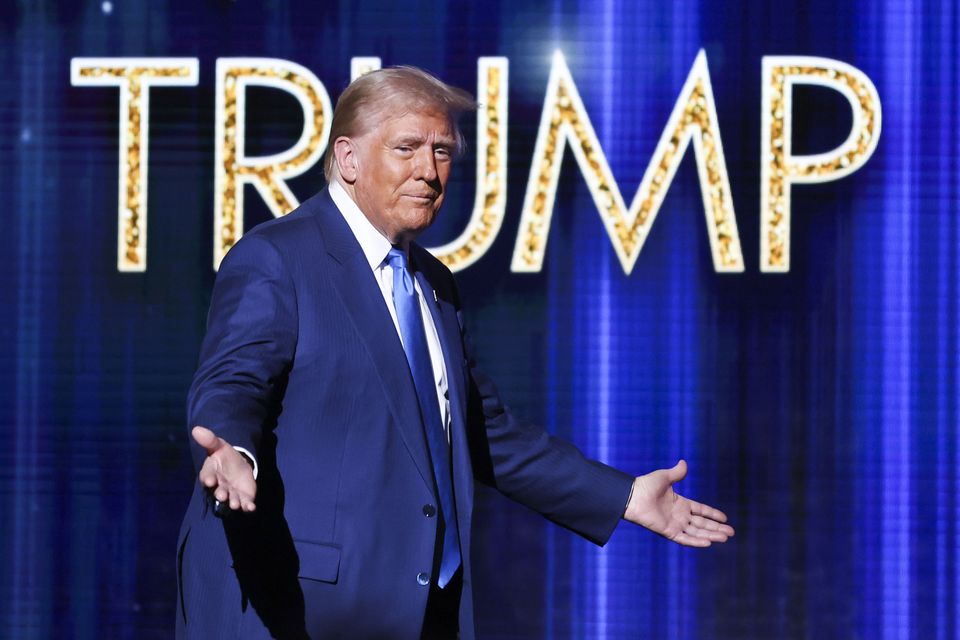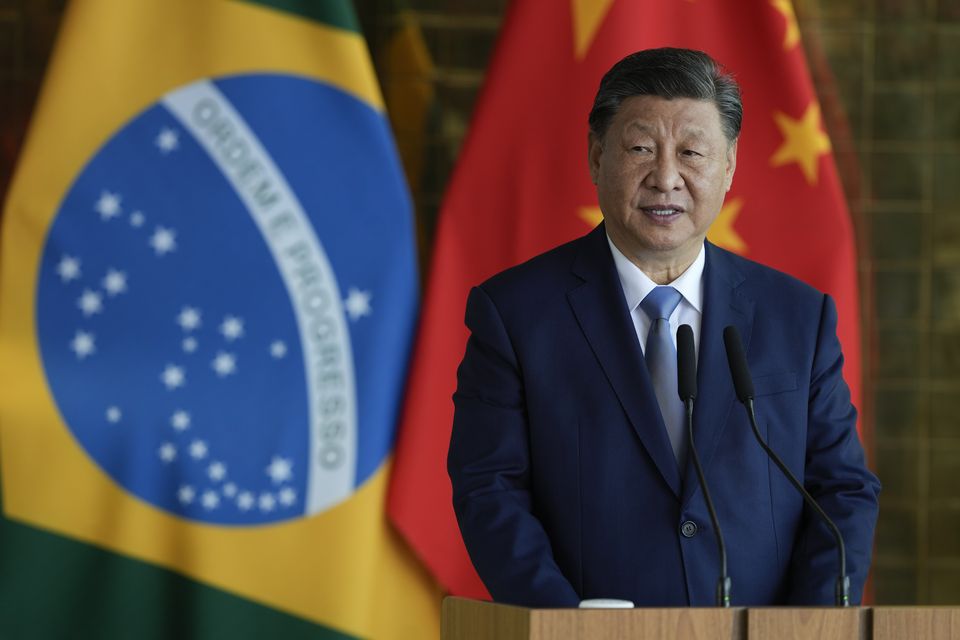President-elect Donald Trump said he has selected former senator David Perdue of Georgia to serve as his ambassador to China.
His choice sees him leaning on a former business executive turned politician to serve as the administration’s envoy to America’s most potent economic and military adversary.
Mr Trump said in a social media post that Mr Perdue “brings valuable expertise to help build our relationship with China”.
Mr Perdue lost his Senate seat to Democrat Jon Ossoff four years ago and ran unsuccessfully in a 2022 primary against Georgia Governor Brian Kemp. Mr Perdue pushed Mr Trump’s debunked lies about electoral fraud during his failed bid for Georgia governor.
President-elect Donald Trump takes the stage before speaking at the FOX Nation Patriot Awards on Thursday in New York (Heather Khalifa/AP)
During his time in the Senate, Mr Perdue was labelled as “anti-China” in a 2019 Chinese think tank report. The former Georgia politician advocated that the US needed to build a more robust naval force to cope with threats, including from China.
Before launching his political career, Mr Perdue held a string of top executive positions, including at Sara Lee, Reebok and Dollar General.
Economic tensions will be a big part of the US-China picture for the new administration.
Mr Trump has threatened to impose sweeping new tariffs on Mexico, Canada and China as soon as he takes office as part of his effort to crack down on illegal immigration and drugs.
He said he would impose a 25% tax on all products entering the country from Canada and Mexico, and an additional 10% tariff on goods from China, as one of his first executive orders.
The Chinese Embassy in Washington cautioned earlier this week that there will be losers on all sides if there is a trade war.
“China-US economic and trade co-operation is mutually beneficial in nature,” embassy spokesman Liu Pengyu posted on X, formerly Twitter.
“No one will win a trade war or a tariff war.”
He added that China had taken steps in the last year to help stem drug trafficking.
Chinese foreign ministry spokesperson Lin Jian did not comment on Mr Perdue’s nomination, saying only “I have noted the relevant reports” when asked about it at a daily briefing in Beijing.
It is unclear whether Mr Trump will actually go through with the threats or if he is using them as a negotiating tactic.
The tariffs, if implemented, could dramatically raise prices for American consumers on everything from gas to automobiles to agricultural products. The US is the largest importer of goods in the world, with Mexico, China and Canada its top three suppliers, according to the most recent US Census data.
Mr Perdue, if confirmed, will have to negotiate a difficult set of issues that goes beyond trade.
Washington and Beijing have long had deep differences on the support China has given to Russia during its war in Ukraine, human rights issues, technology and Taiwan, the self-ruled democracy that Beijing claims as its own.
Donald Trump’s relationship with China’s President Xi Jinping became strained during his first term as US president (Eraldo Peres/AP)
Chinese President Xi Jinping said in a meeting with outgoing US President Joe Biden last month that Beijing stood “ready to work with a new US administration”.But Mr Xi also warned that a stable China-US relationship was critical not only to the two nations but to the “future and destiny of humanity”.
“Make the wise choice,” Mr Xi cautioned during his November meeting with Mr Biden on the sidelines of an international summit in Peru.
“Keep exploring the right way for two major countries to get along well with each other.”
Mr Trump’s relationship with Mr Xi started out well during his first term before becoming strained over disputes about trade and the origins of the Covid-19 pandemic.
Mr Trump seems particularly focused on using tariffs as a pressure point on Mr Xi, even threatening he would use tariffs as a cudgel to pressure Beijing to crack down on the production of materials used in making fentanyl in Mexico that is illegally sold in the United States.
A second Trump administration is expected to test US-China relations even more than the Republican’s first term, when the US imposed tariffs on more than 360 billion dollars (£282 billion) in Chinese products.
That brought Beijing to the negotiating table, and in 2020, the two sides signed a trade deal in which China committed to improve intellectual property rights and buy an extra 200 billion dollars (£156 billion) of American goods. A couple years later, a research group showed that China had bought essentially none of the goods it had promised.
Ahead of Mr Trump’s return to power, many American companies, including Nike and eyewear retailer Warby Parker, have been diversifying their sourcing away from China. Shoe brand Steve Madden says it plans to cut imports from China by as much as 45% next year.
Trump also filled out more of his immigration team Thursday, as he promises mass deportations and border crackdowns.
He said he is nominating former Border Patrol chief Rodney Scott to head US Customs and Border Protection.
Mr Scott, a career official, was appointed head of the border agency in January 2020 and enthusiastically embraced then-president Trump’s policies, particularly on building a US-Mexico border wall. He was forced out by the Biden administration.
Mr Trump also said he would nominate Caleb Vitello as acting director of Immigration and Customs Enforcement, the agency that, among other things, arrests migrants in the US illegally.
Mr Vitello is a career ICE official with more than 23 years in the agency and most recently has been the assistant director for the office of firearms and tactical programmes.
The president-elect named the head of the Border Patrol Union, Brandon Judd, as ambassador to Chile. Mr Judd has been a long-time supporter of Mr Trump, appearing with him during his visits to the US-Mexico border, though he notably supported a Senate immigration Bill championed by Mr Biden that Mr Trump sank in part because he did not want to give Democrats an election-year win on the issue.

